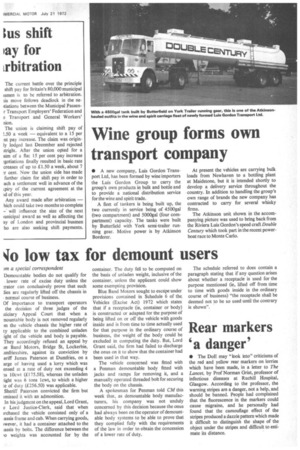go low tax for demount users
Page 13

If you've noticed an error in this article please click here to report it so we can fix it.
2m a special correspondent
Demountable bodies do not qualify for lower rate of excise duty unless the :.rator can conclusively prove that such dies are regularly lifted off the chassis in : normal course of business.
Of importance to transport operators the decision of three judges of the ;ticiary Appeal Court that when a mountable body is not removed regularly ,tn the vehicle chassis the higher rate of ty applicable to the combined unladen :ight of the vehicle and body is payable. They accordingly refused an appeal by ue Band Motors, Bridge St, Lockerbie, imfriesshire, against its conviction by eriff James Paterson at Dumfries, on a arge of having used a lorry which was ensed at a rate of duty not exceeding 4 as lOcwt (£175.58), whereas the unladen ;ight was 6 tons lcwt, to which a higher Le of duty (£256.50) was applicable.
Sheriff Paterson convicted the firm but 3missed it with an admonition.
In his judgment on the appeal, Lord Grant, e Lord Justice-Clerk, said that when irchased the vehicle consisted only of a iassis frame and cab. When carrying goods, iwever, it had a container attached to the iassis by bolts. The difference between the /o weights was accounted for by the container. The duty fell to be computed on the basis of unladen weight, inclusive of the container, unless the applicant could show some exempting provision.
Blue Band Motors sought to escape under provisions contained in Schedule 6 of the. Vehicles (Excise Act) 1972 which states that if a receptacle (ie, container or body) is constructed or adapted for the purpose of being lifted on or off the vehicle with goods inside and is from time to time actually used for that purpose in the ordinary course of business, the weight of the body could be excluded in computing the duty. But, Lord Grant said, the firm had failed to discharge the onus on it to show that the container had been used in that way.
The vehicle concerned was fitted with a Penman demountable body fitted with jacks and ramps for removing it, and a manually operated threaded bolt for securing the body on the chassis.
A spokesman for Penman told CM this week that, as demountable body manufacturers, his company was not unduly concerned by this decision because the onus had always been on the operator of demountable body systems to be able to prove that they complied fully with the requirements of the law in order to obtain the concession of a lower rate of duty.
The schedule referred to does contain a paragraph stating that if any question arises about whether a receptacle is used for the purpose mentioned (ie, lifted off from time to time with goods inside in the ordinary course of business) "the receptacle shall be deemed not to be so used until the contrary is shown".




























































































